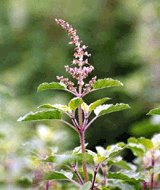Androgen-Excess with PCOS
Poly-Cystic Ovarian Syndrome (PCOS) often manifests itself as an androgen-excess disorder. Ordinarily, the dominant follicle developing during ovulation utilizes androgens secreted from the surrounding ovarian cells to produce estrogen. But in PCOS, since ovulation is impaired, ovarian androgens are not utilized in the ovulation process resulting in elevated levels in the blood stream. These elevated levels further suppress ovulation, thus aggravating the problem.
Excess androgens implies excess testosterone. Not all the testosterone in the blood stream is active. SHBG (Sex-Hormone-Binding-Globulin) is a protein generated by the liver; it binds some of the testosterone and decreases the circulating levels of "free" testosterone. PCOS patients usually have decreased SHBG and elevated free-testosterone. And this often manifests itself as increased male-pattern hair-growth (hirsutism) , acne, male-pattern hair-loss (alopecia), etc.
It is very important to address the issue of increased testosterone and decreased SHBG in treating PCOS. Let us look at some of herbs that have been very effective at this. In this blog, let us focus on Tulsi.
Remedy: Tulsi
Tulsi (Tulasi, Holy Basil, Ocimum sanctum, Vishnupriya) is a very widely grown plant in India. It is said to have divine healing qualities and is therefore grown in households with deep reverence. It is known to have good anti-androgenic effects in androgen-sensitive tissues. It can moderate insulin levels and help with reversing obesity. It has powerful anti-oxidants and has a rejuvenating effect on tissues. It is an adaptogen and decreases provides stress relief.
therefore grown in households with deep reverence. It is known to have good anti-androgenic effects in androgen-sensitive tissues. It can moderate insulin levels and help with reversing obesity. It has powerful anti-oxidants and has a rejuvenating effect on tissues. It is an adaptogen and decreases provides stress relief.
Treatment Methodology
For PCOS, it is recommended that the patient consume 10-12 leaves a day (either raw or boiled in water) early in the morning prior to breakfast. As with most natural remedies, any noticeable improvements from this treatment are likely to occur after about 8-10 weeks of use. Furthermore, the treatment must be accompanied by an appropriate life-style and dietary intake. Though slow, it will restore the delicate natural balance of the hormones and improve health and longevity.
Often patients respond better with fresh leaves or fresh leaf-tea than with the Tulsi-tea that sells in stores. Tulsi supplement as tablet/pill is another option but is secondary to using fresh leaves.
Grow your own Herb
It is very easy to raise Tulsi plants at home. Seeds/saplings are easily procured in India and in the USA; they are usually available in Indian temples/Indian stores. Simply sprinkle the seeds or plant the saplings in a pot. Ensure they get ample sunlight and sufficient water everyday. They cannot withstand severe cold/snow; in the winter they may be placed inside the house by the window to get sunlight. It takes 2-3 months for them to start producing seeds. You can replant them and ensure a steady supply of your medicinal leaves!
No comments:
Post a Comment